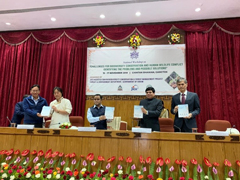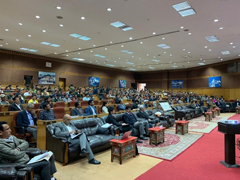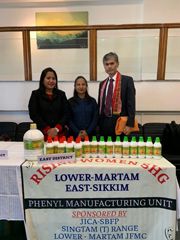- Home
- Countries & Regions
- Asia
- India
- Press Release
- JICA Supports Biodiversity Conservation and Human-Wildlife Conflict Resolution Workshop in Sikkim
Press Release
November 15, 2019
JICA Supports Biodiversity Conservation and Human-Wildlife Conflict Resolution Workshop in Sikkim
- Capacity building to ensure adoption of measures curbing biodiversity loss -
Sikkim, November 15, 2019: The Japan International Cooperation Agency (JICA) supported one and a half day workshop on "Challenges for Biodiversity Conservation and Human-Wildlife Conflicts – Identifying the problems and possible solutions" was held in Sikkim. The states with JICA-supported forestry projects, MoEFCC officials, NGOs and research institutes based in Sikkim were invited to the workshop.
The objective of the workshop was to learn ways of conserving biodiversity, including wildlife which is essential for India because biodiversity loss, results in imbalance of ecosystem with far-reaching impact on livelihoods. The workshop aimed to solve the conflict that occurs between people and wildlife when animals leave protected areas and raid crops, causing problems with local communities.
Mr. L.B. Das, Honourable Speaker, Sikkim Legislative Assembly delivered the inaugural address as the Chief Guest. Mr. Karma Loday Bhutia, Honourable Minister for Forest and Mr. S.C. Gupta, Chief Secretary of Government of Sikkim attended the workshop. Mr. Gupta addressed the delegates. In addition to the officials of the Sikkim government as the host of workshop, representatives of JICA-supported forestry projects which have a component of Biodiversity Conservation and/or human-wildlife conflict like Rajasthan, Uttarakhand, Nagaland and Meghalaya made presentations on their experiences on the issue.
Speaking on the occasion, Mr. Katsuo Matsumoto, Chief Representative, JICA India mentioned about JICA's cooperation to the North East States to promote sustainable development of the region and highlighted that "Conservation of biodiversity is crucial for India because the consequences of biodiversity loss will impact negatively livelihoods, health, food security and overall well-being of human society. JICA has been working to tackle the issue through forestry and biodiversity related projects with state forest departments since 1991. Sikkim biodiversity conservation and forest management project is one of examples and the very first biodiversity conservation centric project supported by JICA. JICA aims to work with a dual conservation strategy which includes conserving protected areas by collaborating with local communities to reduce their impacts on the protected area. Our solutions include improving livelihood base through alternative income generating activities by SHGs and promoting alternative cropping & land-use through appropriate incentive program. This kind of workshop helps all stakeholders present to share and in cross-learn about the challenges, solutions, innovations and opportunities in biodiversity conservation and ways and means to enhance the resilience of local communities with adaptive measures in forest fringe villages."
The increase in human population and subsequent demand for natural resources is leading to degradation and fragmentation of natural habitats thus, creating a situation where humans and wildlife are competing for the same resources. This shift from ‘coexistence' to ‘conflict' has the potential to undermine the existing and future conservation efforts and also hinder achievement of both Sustainable Development Goals (SDGs) and Biodiversity Targets. Mitigation of human-wildlife conflict is thus emerging as one of the key issues of concern. It is crucial to address this issue holistically and to co-create mitigation solutions by engaging all relevant stakeholders. Such initiatives will also contribute particularly to the Sustainable Development Goals 1 (Poverty Reduction) and 15 (Life on Land- protection of land ecosystems, sustainable resource management, biodiversity). Dr. Hasegawa, JICA senior advisor on Biodiversity and Ecosystems presented the identified challenges and possible solutions for human-wildlife conflict, sharing the experiences of human-bear conflict in Hokkaido in Japan, human-elephant conflict in Sri Lanka, amongst other issues. He underlined the importance of quality Environmental Impact Assessment at the time of project formulation, and most importantly, development of long-term policies/strategies that ensure conservation of protected zones. They should be community-based, and involve multiple stakeholders, government agencies to make collective decisions on the use of natural resources.
 The dignitaries on the stage while unveiling of the project publication
The dignitaries on the stage while unveiling of the project publication
 The attendees at the workshop
The attendees at the workshop
 Mr. Matsumoto standing with the women Self Help Group (SHG) which is supported by JICA's Sikkim Biodiversity Conservation and Forestry Management Project
Mr. Matsumoto standing with the women Self Help Group (SHG) which is supported by JICA's Sikkim Biodiversity Conservation and Forestry Management Project
About JICA
Established, by a specific law, as an incorporated administrative institution under the Government of Japan, the Japan International Cooperation Agency (JICA) aims to contribute to the promotion of international cooperation, as a sole Japanese governmental agency in charge of ODA implementation. JICA is the world's largest bilateral donor agency. JICA works as a bridge between Japan and emerging countries, and provides assistance in forms of loan, grant and technical cooperation so that the emerging countries can strengthen their capabilities. JICA has 27 forestry and natural resource management projects in India and has extended an ODA loan of 270 billion Japanese Yen since 1991/92 towards the Sector.
Related Links
For further information, please contact:
JICA India Office
Yuko Shinohara/Vini Sharma
+91 11 49097000
Shinohara.yuko@jica.go.jp
Sharmavini.id@jica.go.jp

- Asia
- Southeast Asia
- Cambodia
- Indonesia
- Laos
- Malaysia
- Myanmar
- Philippines
- Thailand
- Timor-Leste
- Viet Nam
- East Asia
- China
- Mongolia
- Central Asia and the Caucasus
- Armenia
- Azerbaijan
- Georgia
- Kyrgyz Republic
- Tajikistan
- Uzbekistan
- South Asia
- Afghanistan
- Bangladesh
- Bhutan
- India
- Maldives
- Nepal
- Pakistan
- Sri Lanka
- Oceania
- Latin America
- Africa
- Middle East
- Europe
- Asia
- About JICA
- News & Features
- Countries & Regions
- Our Work
- Thematic Issues
- Types of Assistance
- Partnerships with Other Development Partners
- Climate Change / Environmental and Social Considerations
- Evaluations
- Compliance and Anti-corruption
- Science and Technology Cooperation on Global Issues
- Research
- JICA Development Studies Program / JICA Chair
- Support for the Acceptance of Foreign HRs / Multicultural and Inclusive Community
- Publications
- Investor Relations
